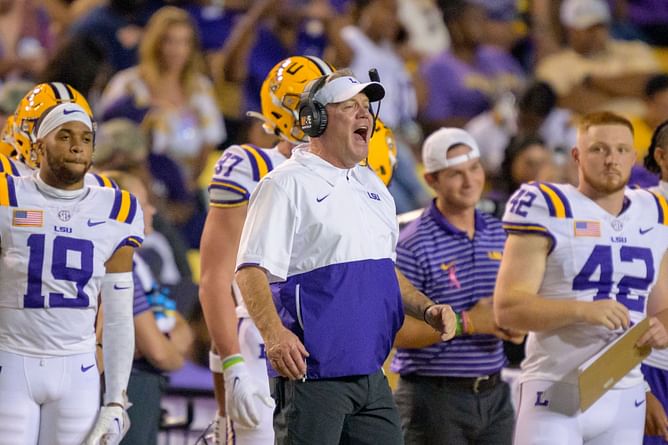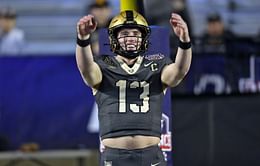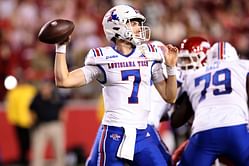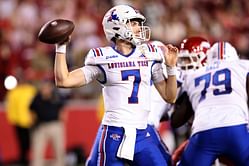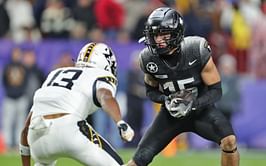Team Information
| Ground | Blaik Field at Michie Stadium |
| City | West Point, New York |
| Conference | American Athletic Conference, |
| Nickname | Black Knights |
Army Black Knights Football Bio
The Army Black Knights football team, formerly known as the Army Cadets, is a formidable force in college football, proudly representing the United States Military Academy. As a member of the NCAA Division I Football Bowl Subdivision (FBS), the Army's dedication to excellence on the gridiron is unwavering. Their home games unfold in the iconic Michie Stadium in West Point, New York, where 38,000 passionate fans gather to support their team.
Coach Jeff Monken has led the Army to significant success since 2014, including three national championships in 1944-1946 and titles in 1914 and 1916. Their football legacy includes 24 Hall of Fame players and four coaches, 37 consensus All-Americans, and three Heisman Trophy recipients, including Doc Blanchard, Glenn Davis, and Pete Dawkins.
Notably independent, the Army primarily competes without conference ties, briefly joining Conference USA from 1998 to 2004. As one of only four FBS schools without a conference, their paramount annual contest is the Commander-in-Chief's Trophy, fought among the top service academies – Army, Air Force, and Navy. This underscores the Army's legacy of excellence and storied rivalries.
| Name of Team | Army Black Knights Football |
| First season | 1890 |
| Athletic director | Mike Buddie |
| Head coach | Jeff Monken, 10th season, 64–49 (.566) |
| Stadium | Michie Stadium Capacity (38,000) |
| Field surface | FieldTurf |
| Location | West Point, New York |
| Conference | Independent |
| Claimed national titles | 3 (1944, 1945, 1946) |
| Rivalries | Air Force, Navy, Notre Dame |
| Fight song | On, Brave Old Army Team |
| Mascot | Army Mules |
Army Black Knights Football Introduction
The Army Black Knights football team, representing the United States Military Academy in college football, holds a storied legacy of excellence. Competing as a Division I Football Bowl Subdivision (FBS) member of the NCAA, the Black Knights play their home games in the iconic Michie Stadium, nestled in the picturesque West Point, New York, with a capacity of 38,000 fervent fans.
Under Coach Jeff Monken's leadership since 2014, Army has excelled, boasting three national championships from 1944 to 1946 and recognized titles in 1914 and 1916. Their legacy includes 24 Hall of Fame players, four coaches, 37 consensus All-Americans, and three Heisman Trophy winners – Doc Blanchard, Glenn Davis, and Pete Dawkins. Beyond the field, Michie Stadium offers a view of the Hudson River, embodying Army's commitment to excellence. The iconic Army Mules, a tradition since 1899, symbolize the academy's indomitable spirit.
Army Black Knights Football History
The illustrious history of Army Black Knights football traces its roots back to November 29, 1890, when the young cadets at West Point accepted the Navy's challenge to engage in a game of this burgeoning sport. Though the Army fell to the Navy that year, they swiftly sought retribution with a victory in Annapolis the following season, igniting a rivalry that persists as the culminating spectacle of the Division I college football season.
During the WWII era, from 1944 to 1950, Army football achieved unparalleled glory under the stewardship of coach Earl Blaik. The team secured three consecutive national championships and was graced by three Heisman Trophy winners: Doc Blanchard (1945), Glenn Davis (1946), and Pete Dawkins (1958). The legacy of Army football extends beyond the field, with future NFL coaching luminaries Vince Lombardi and Bill Parcells launching their careers as Army assistant coaches.
Michie Stadium, where the Army plays its home games, is a hallowed ground named after the legendary Earl Blaik. Cadets, bound by tradition, attend games en masse and stand unwaveringly throughout, embodying the spirit of the academy. The team's roots include being known as the "Cadets" before adopting the "Black Knights of the Hudson" moniker in the 1940s, which later evolved into the official name, the "Black Knights," in 1999.
Notably, the Army transitioned between conference affiliations, participating in Conference USA from 1998 to 2004 before returning to independent status in 2005. The annual showdowns against the Navy and Air Force for the coveted Commander-in-Chief's Trophy remain a defining aspect of the Army's storied football tradition. The 2016 Army-Navy Game, ending a streak of fourteen losses, is emblematic of the resilience and valor that define Army Black Knights football.
Army Black Knights Football Coach
The current head coach of the Army Black Knights Football team is Jeffrey Michael Monken. He has held this position since the 2014 season. He brings a wealth of coaching experience, having previously served as the head coach of Georgia Southern University and worked with other prominent institutions like the United States Naval Academy and Georgia Tech.
| Coach Tenure | Coach Name |
| 1890, 1892 | Dennis Michie† |
| 1891 | Henry L. Williams |
| 1893 | Laurie Bliss |
| 1894–1895 | Harmon S. Graves |
| 1896 | George P. Dyer |
| 1897–1900 | Herman Koehler |
| 1901 | Leon Kromer |
| 1902 | Dennis E. Nolan |
| 1903 | Edward Leonard King |
| 1904–1905 | Robert Boyers |
| 1906–1907 | Henry Smither |
| 1906, 1912 | Ernest Graves, Sr. |
| 1908–1910 | Harry Nelly |
| 1911 | Joseph Beacham |
| 1913–1916, 1919–1922 | Charles Dudley Daly |
| 1917 | Geoffrey Keyes |
| 1918 | Hugh Mitchell |
| 1923–1925 | John McEwan |
| 1926–1929 | Biff Jones |
| 1930–1932 | Ralph Sasse |
| 1933–1937 | Garrison H. Davidson |
| 1938–1940 | William H. Wood |
| 1941–1958 | Earl Blaik |
| 1959–1961 | Dale Hall |
| 1962–1965 | Paul Dietzel |
| 1966–1973 | Tom Cahill |
| 1974–1978 | Homer Smith |
| 1979 | Lou Saban |
| 1980–1982 | Ed Cavanaugh |
| 1983–1990 | Jim Young |
| 1991–1999 | Bob Sutton |
| 2000–2003 | Todd Berry |
| 2003 | John Mumford |
| 2004–2006 | Bobby Ross |
| 2007–2008 | Stan Brock |
| 2009–2013 | Rich Ellerson |
| 2014–present | Jeff Monken |
Army Black Knights Football Stadium: Michie Stadium
Michie Stadium, nestled within the historic grounds of the U.S. Military Academy in West Point, New York, stands as an iconic venue with a rich legacy in American football. Since its inauguration in 1924, this outdoor stadium has been the proud home field of the Army Black Knights, boasting a present-day seating capacity of 38,000 spectators.
Perched at an elevation of 335 feet above sea level, Michie Stadium offers breathtaking views of the majestic Hudson River and the Neo-Gothic architectural splendor of the academy below. Such scenic grandeur led to its recognition as Sports Illustrated's third-ranked sports venue of the 20th century.
This stadium is a testament to the indomitable spirit of Dennis Michie, an Academy alumnus who pioneered the football program during his cadet days. Tragically, Michie lost his life in the Spanish-American War, but his enduring legacy lives on in the stadium that bears his name.
In 1999, the field itself was aptly named "Blaik Field" in honor of Earl "Red" Blaik, the beloved coach who led the Army to three consecutive national titles from 1944 to 1946.
Over the years, Michie Stadium has witnessed transformations, including the transition to FieldTurf in 2008, replacing earlier surfaces like AstroPlay and AstroTurf. This storied ground serves not only as a battlefield for football but as a hallowed place where history, tradition, and the indomitable spirit of West Point converge.
Army Black Knights Football Rivals
The Army Black Knights Football team boasts enduring rivalries that are steeped in tradition and competition. One of the most prestigious is the Commander-in-Chief's Trophy, a triangular clash that features the Air Force, Army, and Navy. Since 1972, these service academies have battled annually for the trophy, with the Air Force leading the charge with 21 victories, followed by the Navy with 16, and the Army with 9, including 4 shared victories.
The rivalry with the Air Force is intense, with the Air Force holding a 37-18-1 lead through 2021. In 2020, the Army-Air Force game became the longest uninterrupted intersectional rivalry in college football due to the cancellation of the Navy-Notre Dame game.
Army's storied rivalry with Navy, epitomized by the Army-Navy Game, has roots dating back to 1890. Played annually since 1930, this rivalry is one of the oldest in NCAA history, with the Navy currently holding a 62-53-7 lead.
Though not as frequent, the Army-Notre Dame rivalry is significant. Meeting sporadically since their early 20th-century heyday, these two football powerhouses last clashed in 2016, with a storied history that includes the iconic 1946 "Game of the Century," where Notre Dame leads the series 39-8-4 through 2018.
Army Black Knights Football Record and stats
The Army Black Knights Football program boasts a rich history of success and achievement. They have clinched five national championships, with titles claimed in 1944, 1945, and 1946. Furthermore, Army's excellence on the gridiron extends to earlier years when they were selected by major selectors in 1914 and 1916. The visionary leadership of Charles Daly guided these remarkable teams.
One of the most prestigious accolades in East Division I FBS college football is the Lambert Trophy, established in 1936. The Army has earned this honor an impressive nine times. Seven of those victories were under the esteemed leadership of head coach Earl "Red" Blaik during the 1940s and 1950s, showcasing their dominance in the region. The legacy of achievement continues into the 21st century, with head coach Jeff Monken securing Lambert Trophy victories in 2018 and 2020.
Army Black Knights Football Roster
The Army Black Knights Football team's roster is a diverse assembly of talented athletes, each bringing their unique skills and attributes to the gridiron. Leading the charge at quarterback is a mix of experience and youthful potential. Notable figures include Mitch Bolden, a promising freshman from West Chester, OH, and Dewayne Coleman, a sophomore hailing from Selma, TX. They are joined by Bryson Daily, Champ Harris, Cale Hellums, Alex Meredith (currently sidelined due to a leg injury), Zach Mundell, Hayden Oviatt, and Larry Robinson, each contributing their skills and determination to the team's success.
In the running back position, the Black Knights boast a formidable arsenal. Jakobi Buchanan, a senior from St. Charles, MO, brings his impressive size and experience to the backfield, while Jarel Dickson and Markel Johnson, both juniors, provide depth and agility to the running game.
This diverse roster represents various hometowns and backgrounds, uniting under the Army banner to pursue excellence on the football field. With a mix of seasoned veterans and promising newcomers, the Army Black Knights are prepared to face their adversaries and strive for victory in the upcoming season.
Army Black Knights Football Schedule
The Army Black Knights Football team embarked on their 2023 season with a challenging matchup against UL Monroe, which they narrowly lost with a score of 17-13. Their following game saw a resounding victory against Delaware State, where they triumphed with a commanding 57-0 score.
Looking ahead, the Black Knights have a packed schedule with matchups against notable opponents. On September 16, they will face UTSA, followed by a clash with Syracuse on September 23. In October, they take on Boston College, Troy, and LSU, presenting a series of demanding contests. The battle continues in October with a game against Massachusetts. November features matchups against Air Force, Holy Cross, and Coastal Carolina, setting the stage for the much-anticipated showdown against Navy on December 10.
As the Army Black Knights navigate their 2023 football season, their fervent fan base eagerly anticipates each game, hoping for a triumphant season ahead.
FAQs
A. The Army Black Knights football team was established in 1890.
A. The Army football team has won five national championships, with titles claimed in 1944, 1945, and 1946, and earlier selections in 1914 and 1916.
A. Army has produced three Heisman Trophy winners: Doc Blanchard (1945), Glenn Davis (1946), and Pete Dawkins (1958).
A. The home stadium of the Army Black Knights is Michie Stadium, located in West Point, New York, with a capacity of 38,000.
A. The Commander-in-Chief's Trophy is contested annually among the three major service academies: Army, Air Force, and Navy. The Army has won the trophy nine times, most recently in 2020.
A. The primary rivals of the Army Black Knights are the Air Force, Navy, and Notre Dame, with annual matchups against the Air Force and Navy being particularly significant.
